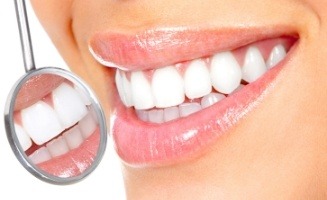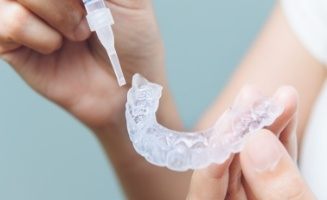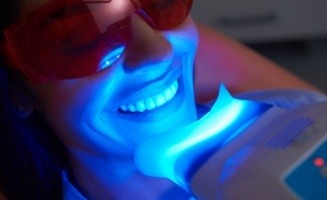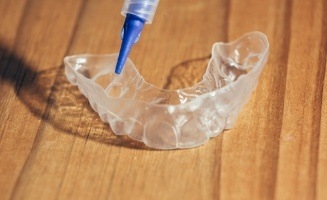Teeth Whitening – Edison, NJ
A Brighter & Better Smile the Easy Way
How can teeth whitening improve my smile?

Teeth whitening can brighten your smile several shades, erasing years of stains and yellowing in as little as one appointment or in just a few weeks with take-home whitening. Whiter teeth tend to make patients look younger and feel more confident about their smiles. A simple teeth whitening treatment may be all you need to dramatically improve the appearance of your smile. Call One Dental New Jersey today to schedule an appointment for teeth whitening in Edison.
How at-home teeth whitening works
Treatment Plan

At your consultation, you’ll discuss your needs with your cosmetic dentist. If teeth whitening isn’t right for your situation, they can provide alternatives for you. But if teeth whitening is the best option, they will provide a treatment plan that allows you to achieve your desired level of brightness.
Impressions for Custom Trays

To start your at-home teeth whitening treatment, your Edison cosmetic dentist will take impressions of your teeth using dental trays and putty. These impressions will be sent to a dental lab, where a set of reusable, durable custom whitening trays will be built for your teeth.
Instructions & Application

Once your custom trays have been built, you’ll come back into our office to get your trays from your dentist, as well as a set of whitening products and instructions on how to use your whitening trays. Then, you’ll simply follow these instructions and whiten your teeth in the comfort of your own home.
Types of whitening treatments
Take-Home Teeth Whitening

Take-home teeth whitening lets you brighten your smile in the comfort of your own home, and provides more subtle, gradual cosmetic results over the course of about a week.
We’ll first take impressions of your teeth using either dental putty or digitally with an intraoral scanner. With these impressions, a set of reusable custom whitening trays will be manufactured just for you.
Once the trays are ready, they’ll be given to you along with the whitening product and instructions for their use. Simply follow your Edison dentist's instructions, and you’ll get professional-grade results in no time!
In-Office Teeth Whitening

In-office teeth whitening is done by your dentist and provides fast results. Treatments can brighten your smile up to 10 shades in about an hour, so the treatment is perfect if you want to whiten your teeth for an upcoming special occasion.
Your dentist will apply a special protective gel to your gums, while using retractors to keep your cheeks away from your teeth and the whitening treatment. Then, they will apply a powerful whitener to your teeth and activate it with a UV light. After usually around an hour, the treatment is rinsed away to reveal a brighter, more beautiful smile. This process may be repeated several times over multiple appointments to achieve your desired level of whiteness.
UV Teeth Whitening

UV (ultraviolet) teeth whitening is used as part of the in-office whitening procedure and involves the use of ultraviolet light that helps activate and excite the peroxide molecules used in teeth whitening products. By doing so, UV whitening helps speed up the process of whitening, and provides you with a brighter smile.
Chemical Teeth Whitening

All commonly used and approved teeth whitening products use chemical teeth whitening agents known as “peroxides.” The two most frequently used chemical compounds are carbamide peroxide and hydrogen peroxide.
These chemicals whiten your teeth at a molecular level by destroying and removing stains. Peroxides contain highly volatile oxygen molecules that react strongly to the presence of surface stains. When they contact stains, peroxides break the bonds that hold them in place on your teeth, and “bleach” them away from your teeth, leaving behind natural, bright enamel.
Teeth Whitening FAQs
Can teeth whitening damage teeth?
Professional teeth whitening that is overseen and administered by a qualified dentist will never damage your teeth. Your dentist will ensure that you get the proper whitening products and that you do not over whiten your teeth.
However, it is possible to damage the teeth by over whitening them. The peroxide-based whiteners used in the teeth whitening process can weaken the teeth and damage the enamel if they are not used properly or are used too frequently.
For this reason, it’s a good idea to avoid over the counter (OTC) teeth whitening kits from sources like Amazon and other websites, which could contain dangerously-high levels of peroxide.
If you do not want to pay for professional teeth whitening services from your dentist in Edison, NJ make sure you only use ADA-approved whitening products like Crest Whitestrips. ADA-approved products have relatively low concentrations of peroxide, so the risk of enamel damage from over-whitening is much lower.
Which teeth whitening products actually work?
There are two categories of teeth whitening products that actually work.
The first are abrasive whiteners, such as toothpaste that contains baking soda (sodium bicarbonate), and other very mild abrasives. These abrasives work similarly to sandpaper, rubbing plaque and surface stains away from your teeth. These abrasive whiteners work on minor stains, but the abrasive is not strong enough to damage enamel.
It is recommended that you avoid charcoal toothpaste, which has abrasives that may be hard enough to damage your enamel with frequent use. Stick to an ADA-approved whitening toothpaste product.
The second category of teeth whitening products that actually work are chemical whiteners that contain peroxide. These are available both from dentists and over the counter, but it’s best to work with a dentist to get your desired results and ensure that your teeth are not damaged by over whitening.
To explore your options in further detail and make sure you choose a safe, effective teeth whitening product, get in touch with your dentist for a consultation.
Why does teeth whitening cause sensitivity?
The precise reason that whitening causes sensitivity is not fully known, but the leading theory is that it’s due to “dentinal microtubules.” These extremely small, microscopic channels in our teeth connect the exterior of the tooth enamel to the interior nerve, allowing us to feel sensations in our teeth.
The theory is that, since peroxide-based whiteners weaken the enamel very slightly, this exposes the microtubules, which become much more sensitive. Then, as the enamel remineralizes and becomes stronger after the whitening process is over, they are sealed up again, and no longer feel overly sensitive. This would explain why the sensitivity caused by teeth whitening typically only lasts for a few days.
What to Avoid When Whitening Your Teeth
After having your teeth whitened, you’ll be thrilled to show off your pearly white smile and no doubt eager to preserve it. While brushing your teeth, flossing, and getting regular dental cleanings will preserve your whitening treatment, there are many staining foods and drinks you should avoid to prevent staining your newly whitened teeth.
The worst offenders are coffee, tea, and red wine, but there are many staining foods and drinks you’ll want to steer clear of. Highly pigmented foods and drinks like sauces and berries, acidic drinks, dark fruits, and tobacco products are all things you should try to avoid.
This is especially important in the first 48 hours but you should only consume these foods in moderation if you want to preserve the shade of your teeth. Whitening treatments last for 6 months to 3 years and if you regularly stain your teeth, you may notice your teeth quickly becoming discolored. Another trick is to drink through a straw, though this will not completely eliminate the risk of premature discoloration.
Should I Get My Teeth Cleaned Before Whitening?
There are several reasons why a dental cleaning is a crucial prerequisite for teeth whitening. For one, you will be able to detect any present tooth decay that needs to be treated before undergoing cosmetic treatments.
During a cleaning, we will also remove surface stains and plaque buildup, which is a sticky yellow bacterial substance that forms on the teeth. If you don’t clear away surface stains and plaque buildup before your whitening treatment, this buildup can prevent the peroxide in the whitening agent from penetrating the tooth enamel and can reduce the whitening effect.
Another positive is that you might notice that a dental cleaning is sufficient enough to achieve whiter teeth. When you have mild discoloration, this can be a result of surface stains and plaque that have not yet been removed.
Since dental cleaning is a much cheaper procedure, this can save you money. The cleaning will also remove food particles that are trapped between your teeth so the whitening treatment can penetrate every surface of the teeth.
Can I Get My Teeth Whitened If I Have Cosmetic Work?
You can get a whitening treatment if you have cosmetic work but keep in mind that dental restorations such as dental crowns, bridges, veneers, and fillings do not respond to whitening treatments.
Teeth whitening is specifically designed to lighten the shade of your natural tooth enamel and will not lighten the shade of your dental restorations. If you have any dental work, you want to ensure that your teeth will not be a different shade from your crowns, veneers, or fillings because they are matched to your natural tooth color.
We can plan your whitening treatment around this to blend your smile seamlessly. If possible, it’s best to get your teeth whitened before receiving other restorations.
